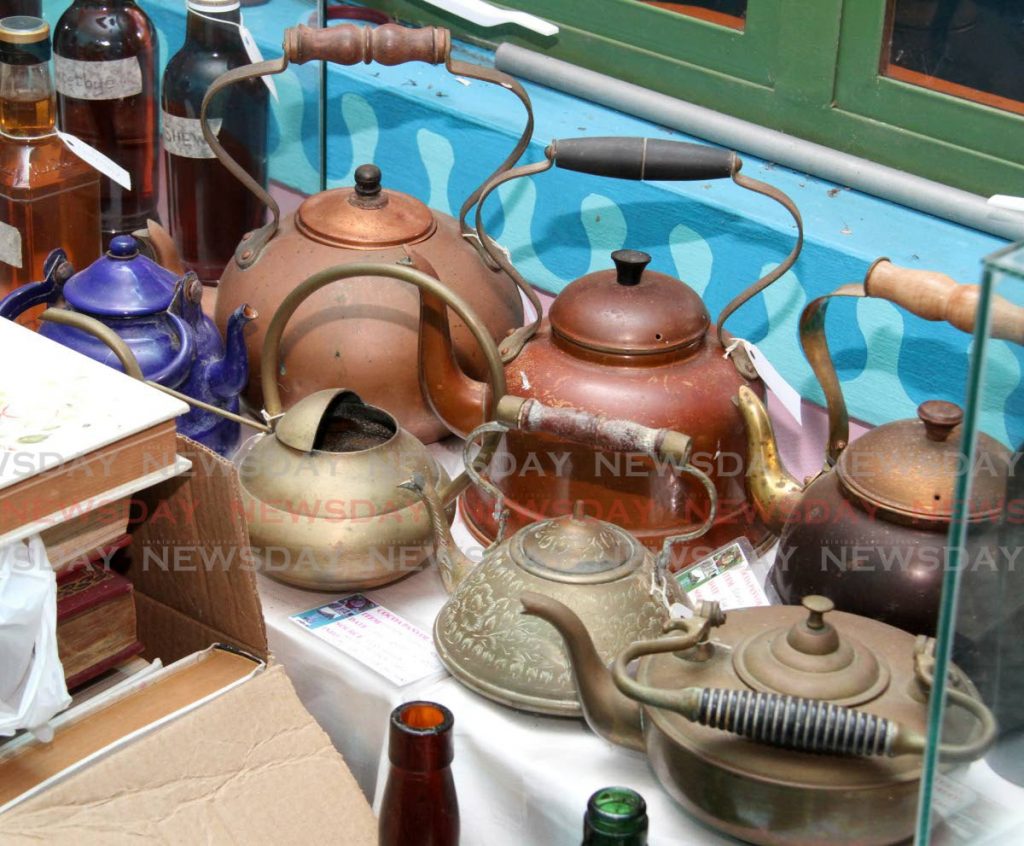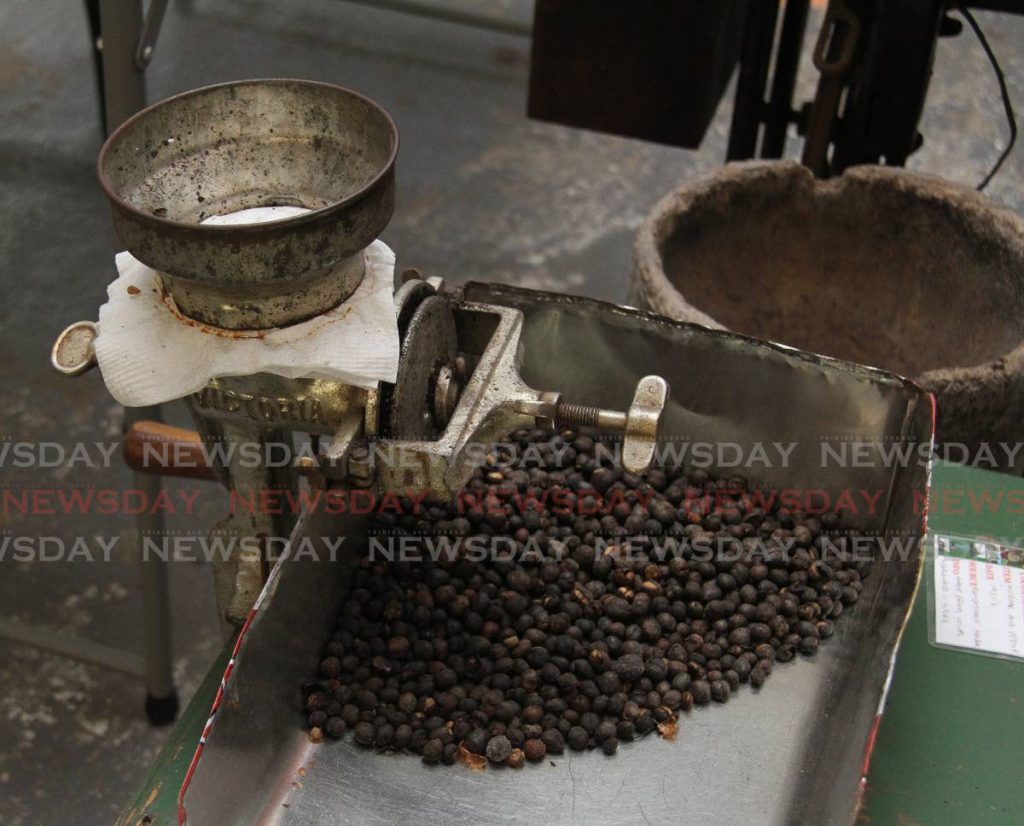Cocoa Panyol an art teacher's museum on Central Trinidad's past

Walking into Clive Teemul's home-based museum in Central Trinidad, the lyrics “bring back the old time days, bring back them old time ways” of Nappy Mayers' Ole Time Days come to mind.
Teemul, 54, who lives in Telemaque Road, Flanagin Town has converted his garage into a museum, which has hundreds of artefacts from as far back as the late 1880s.
What started out as a hobby for Teemul, an art teacher at Tabaquite Secondary School, gradually grew into the museum, Cocoa Panyol, which he created in 2017, and now welcomes visitors from across the country.
Teemul said he always enjoyed collecting old items once used by previous generations and the overwhelming response from the community fuelled his habit.
“We had items from my deceased parents, but it was not organised properly. It was only when I was putting together a Christmas project in 2017, 'tribute to the elders', the concept of the museum came about.
“When I saw the impact it had on people, especially our elders, I realised that the geographical area needed some kind of a museum to preserve its rich history.”

According to the National Trust, Flanagin Town was named after Clifton Flanagin, who after much deliberation and lobbying was able to secure a railway station in the area in 1903.
“The railway operated for 67 years through the station at Caparo until it was closed, along with the rest of the line to Rio Claro, on August 30 1965,” the National Trust website said.
Teemul, who has lived all his life in Flanagin Town, said much was needed to preserve its rich culture, cocoa fields, cocoa houses, churches and other architecture.
He said he has been working with the National Trust and other stakeholders to find a permanent home in the community for Cocoa Panyol, but the pandemic halted the plans.
“There is a very high appreciation for what I do; people come from all over to experience the walk down memory lane and to also learn and teach others about the collection.
“My collection transcends ethnicity or religious groups. It is about unity because in rural areas everyone shared their tools and utensils. So, my collection is not sorted by that, although we know which was brought by the Africans Indians, Amerindians and so on.”
Teemul's collection consists of, but is not limited to, carpentry tools, farming tools, scales, musical instruments, pottery, cooking utensils, sewing machines, religious books, stamps and coins. Moving into a more modern era he collected various versions of typewriters, radios, televisions, projectors, telephones, soda bottles and clothing heat press, among other items.
https://youtu.be/hAEjp_WNcCk
On the visit to the museum, the Sunday Newsday team was greeted with warmth, and the smell of bread being freshly made and cocoa tea from pods that had been dried and ground.
The kitchen where the delicious bread and tea were made was constructed by Teemul in a corner of his garage. It has wooden counter tops and shelving, a kerosene stove, and a galvanised oven. The bread and tea were served in enamel plates and cups. The cocoa tea was strong but sweet and the soft bread melted in the mouth.
Cocoa Panyol has been closed to the public because of the covid19 health regulations but Teemul hoped that by December it would reopen.
https://youtu.be/K4zF9lJf-XY
He said a visit to the museum was much more than looking at the artefacts and hearing about the history of Flanagin Town which falls within the districts of the Couva/Tabaquite/Talparo Regional Corporation.
“The real treat is being able to participate in our activities which allows people to roast and grind the own coffee or make their own cocoa tea with the utensils here and even making their own bread.”
Teemul has slowly been getting the younger members of his family involved in the museum. Having no children of his own, he has been mentoring his nieces and nephews to take up the mantle of pushing the museum forward.
Joshua Ragbir, Teemul’s nephew said the coffee and cocoa experience tours carries a $50 fee per person which allows for various hands-on activities.
“For the coffee experience, people can roast their coffee on the chulha, grind it and brew it themselves. There was also a session in December 2019 where people learnt to make pastels, paimee, black cakes, breads, chillibibi and sorrel. All of this was done using traditional methods," he said.

In 2018, Ragbir added, young people in the community participated in an art class which taught various techniques of drawing still-life images using the artefacts as the subject, while also learning about their history.
Christopher Singh, one of Teemul's nephews, said, “I will be investing time and continuing with this museum because it cannot die. The future generations need to understand and appreciate our rich past and histories and we contribute a little to that.”
Teemul said he does not use the museum to generate income but noted that they accepted donations and charged a small fee for planned tours to offset the cost of expenses for their various activities.
“The extra money that we gain from the tours are used to create and purchase glassing casing for the items which help with its preservation.
“The money is also reinvested to create other attractions and when we reopen, I would like to introduce wine-making and patois classes.”
To contact the Cocoa Panyol museum, call or WhatsApp 733-5701 or visit is Facebook page at facebook.com/Cocoa-Panyol-Museum-909854779189919


Comments
"Cocoa Panyol an art teacher’s museum on Central Trinidad’s past"